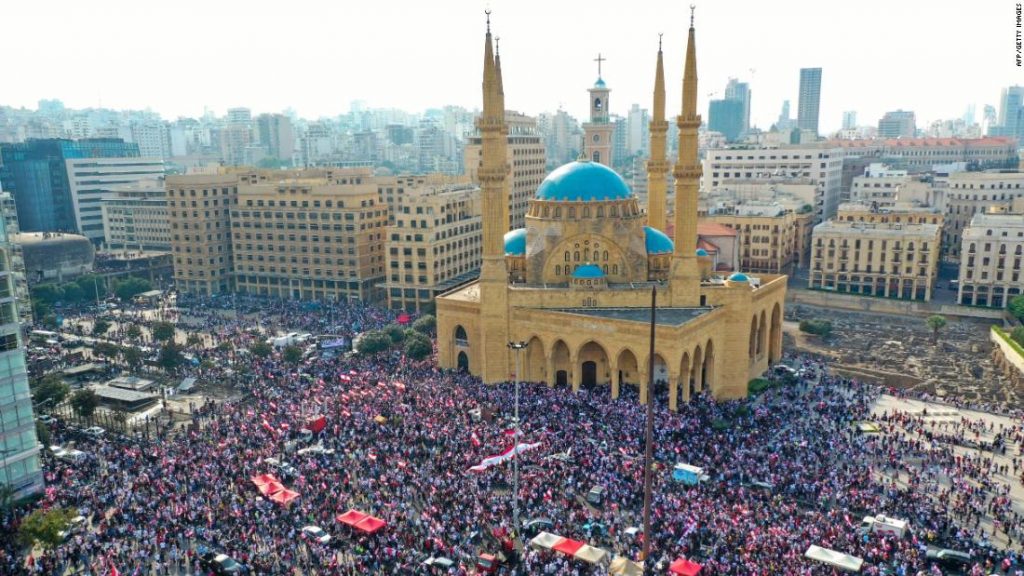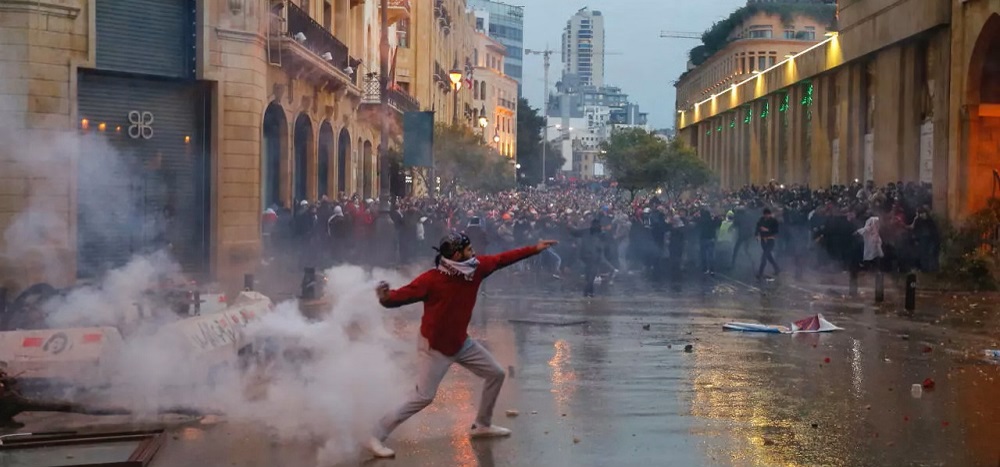El primer ministro Hassan Diab renunció junto a su gabinete este 10 de agosto, señalando que la “corrupción crónica” del país fue responsable de la explosión que destruyó el puerto y media cuidad de Beirut el 4 de agosto.
Por Maher Khazaal
La monstruosa explosión que estalló en el puerto de Beirut el 4 de agosto, devastó la mitad de la capital libanesa, dejó cientos de muertos, miles de heridos, más de 300.000 personas sin hogar y provocó una profunda crisis humanitaria.
Ante la falta de respuesta del gobierno, fue la población misma que bajó en masa a las zonas más devastadas a apagar los fuegos, levantar los escombros y ayudar a los heridos y atrapados. Mientras tanto, se fue conociendo que las causas de la explosión yacían en la criminal desidia del gobierno, que había ignorado reiteradas advertencias sobre el peligro de 2.750 toneladas de nitrato de amonio almacenadas en el puerto de Beirut.
La indignación del pueblo libanés no se hizo esperar. Hartos de un régimen completamente agotado, miles se volcaron a las calles, colmando la Plaza de los Mártires y grupos de manifestantes tomaron los ministerios de Economía y Medioambiente. Otro grupo, dirigido por oficiales retirados del ejército ocuparon el Ministerio de Asuntos Exteriores, declarándolo “cuartel general de la revolución”.
El gobierno respondió sacando a al ejército a la calle, que reprimió brutalmente al pueblo movilizado, pero no pudo detener la rebelión, que ganó las calles y enfrentó a las fuerzas represivas día tras día contra un gobierno completamente deslegitimado, que primero anunció elecciones anticipadas, y finalmente tuvo que renunciar ante el repudio social generalizado.

Epicentro de un ascenso mundial
La rebelión del pueblo libanés no nació en respuesta a la explosión del 4 de agosto. En octubre del año pasado las masas tomaron las calles durante semanas, obligando a la renuncia del primer ministro de ese momento, después de que intentara imponer un impuesto a los mensajes de WhatsApp. Ese impuesto fue la gota que colmó el vaso, desatando un proceso revolucionario que continúa hoy contra el régimen confesional y sectario que nació con el fin de la guerra civil en 1989.
El pueblo se levantó contra 30 años de neoliberalismo, entrega, ajuste y corrupción que llevaron al Líbano a un colapso económico total en 2019. Por eso, el nuevo gobierno, surgido de los mismos partidos políticos del régimen, no ofreció solución alguna ni detuvo el proceso de movilización.
La cuarentena impuesta por la pandemia de coronavirus permitió al gobierno una pausa en las protestas, que igualmente duró poco. Desde el 20 de abril, el pueblo volvió a tomar las calles, radicalizado y apuntando contra el gobierno y los bancos al grito de “mejor morir de coronavirus que de hambre”.
Tanto en octubre como en los últimos meses, la juventud libanesa estuvo a la cabeza de la rebelión, un proceso que no se limita al país, sino que recorrió el mundo el año pasado, y que la vez tiene al Líbano como un epicentro que inspira y contagia un proceso de rebelión contra el ajuste y la represión capitalista en toda la región, que ha visto importantes movilizaciones en Irán, Irak y otros países en los últimos meses.
La explosión en el puerto precipito otro capítulo del proceso revolucionario que se venía desarrollando y se profundiza día a día.
Fuera el imperialismo
El presidente de Francia, Emmanuel Macron, visitó Beirut el día después de la explosión. Detrás de su mentiroso discurso humanitario, se esconden dos preocupaciones del imperialismo francés. Una es defender los sus intereses económicos en el país, que fue protectorado de Francia de 1920 hasta 1943. Desde entonces, la burguesía francesa ha mantenido importantes negocios en el Líbano.
Por otro lado, Francia es de los países más sacudidos por el ascenso mundial de la lucha de clases, con la rebelión de los chalecos amarillos e históricas huelgas generales. Si algo tiene claro Macron es que la extensión de la revolución libanesa en la región, tendrá repercusiones en Europa también, al igual que la Primavera Árabe lo tuvo en 2011.
Tan poco disimulada fueron las intenciones intervencionistas de Macron, que durante su visita comenzó a circular un petitorio “pidiendo” que Francia tome control del país por 10 años. Este intento neocolonial del imperialismo francés debe ser enfrentado y derrotado.
Solidaridad internacionalista: 1 dólar para el Líbano
Nuestros compañeros y compañeras del Movimiento por el Cambio han estado en la vanguardia de la rebelión desde octubre, siendo una de las organizaciones dirigentes más influyentes del acampe permanente y las movilizaciones diarias que voltearon al gobierno de entonces.
Desde la explosión del puerto, han estado organizando la limpieza de escombros, recolección y distribución de comida y otras necesidades y alojamiento de familias que perdieron su vivienda. Y han vuelto a estar en primera fila en este nuevo levantamiento.
La movilización tiene planteado el desafío de ponerle fin a los acuerdos entre las sectas religiosas para dividirse las distintas instituciones de gobierno e imponer elecciones completamente libres.
Nuestros compañeros vienen impulsando un llamado al conjunto de la izquierda para plantear una salida y una alternativa política de los trabajadores y los sectores populares para enfrentar a todos los partidos tradicionales del régimen quebrado y los intentos intervencionistas del imperialismo.
Ellos necesitan nuestro apoyo y solidaridad. Por eso, la Conferencia de la LIS que se realizó este 8 y 9 de agosto, con la participación de organizaciones y militantes revolucionarios de 28 países, votó impulsar la campaña internacional de solidaridad “un dólar por el Líbano”, para recaudar fondos críticamente necesitados allí y respaldar la lucha de los revolucionarios libaneses.




